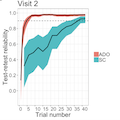Abstract
Machine learning has the potential to facilitate the development of computational methods that improve the measurement of cognitive and mental functioning. In three populations (college students, patients with a substance use disorder, and Amazon Mechanical Turk workers), we evaluated one such method, Bayesian adaptive design optimization (ADO), in the area of delay discounting by comparing its test-retest reliability, precision, and efficiency with that of a conventional staircase method. In all three populations tested, the results showed that ADO led to 0.95 or higher test-retest reliability of the discounting rate within 10-20 trials (under 1-2 minutes of testing), captured approximately 10% more variance in test-retest reliability, was 3-5 times more precise, and was 3-8 times more efficient than the staircase method. The ADO methodology provides efficient and precise protocols for phenotyping individual differences.
